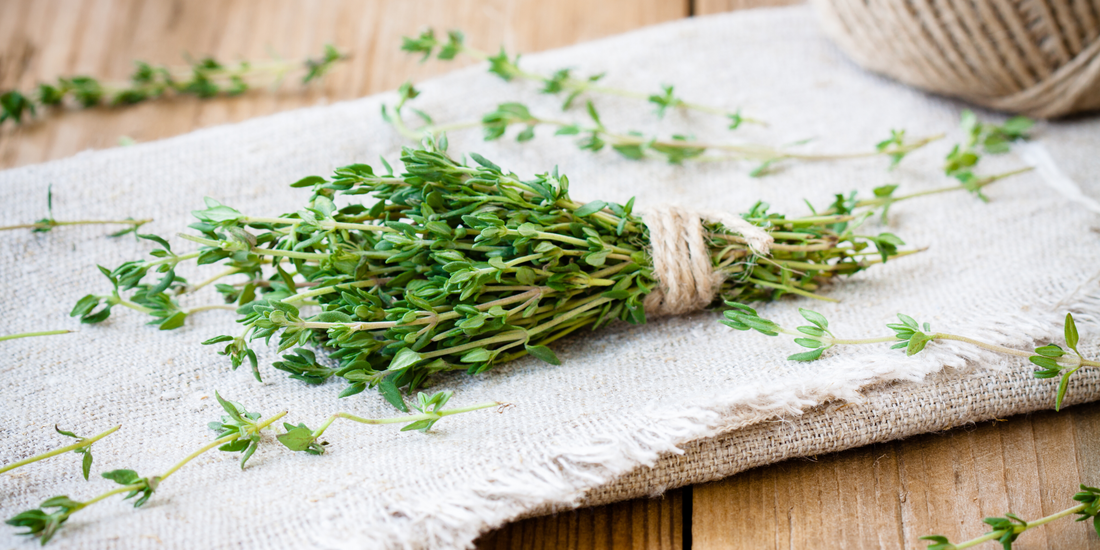Benefits and Uses of Thyme Oil
Thyme Essential Oil (Thymus Zygis)
We all know thyme as a common herb used to enhance the flavor of food. It has a pleasant taste that adds a savory and herbaceous element to dishes. Thyme is a member of the genus Thymus and belongs to the Lamiaceae family.
There are many species of genus Thymus, but the most cultivated for culinary purposes is the Thymus Vulgaris which is a flowering plant that also belongs to the Lamiaceae family. What keeps the Thymus Zygis apart from other species of thyme is that Thymus Zygis is a gynodioecious, a breeding system found in some flowering plant species. Gynodioecy occurs as a result of a genetic mutation of plants. There is less than 1% of plants that exhibit the breeding system with Thymus Zygis being one among them.
Several species of thyme are used in making thyme essential oil that includes thymus zygis and thymus vulgaris. Thyme oil contains several compounds that offer many benefits. These compounds include carvacrol, thymol, linalool, cineol, camphor, and borneol, which are beneficial for different uses of thyme essential oil.
Health benefits offered by thyme essential oil
Like many other essential oils, thyme essential oil is a great source to calm the mind and the body. It is sometimes used in aromatherapy to warm the body and foster a great sense of self-confidence.
The statements contained herein have not been evaluated by the Food and Drug Administration. Neither Sixth Scents nor its products are intended for the purpose of diagnosing, treating, curing, or preventing any disease. If you are pregnant, nursing, taking medication, or have a medical condition, consult your physician before using these products.
We all know thyme as a common herb used to enhance the flavor of food. It has a pleasant taste that adds a savory and herbaceous element to dishes. Thyme is a member of the genus Thymus and belongs to the Lamiaceae family.
There are many species of genus Thymus, but the most cultivated for culinary purposes is the Thymus Vulgaris which is a flowering plant that also belongs to the Lamiaceae family. What keeps the Thymus Zygis apart from other species of thyme is that Thymus Zygis is a gynodioecious, a breeding system found in some flowering plant species. Gynodioecy occurs as a result of a genetic mutation of plants. There is less than 1% of plants that exhibit the breeding system with Thymus Zygis being one among them.
Several species of thyme are used in making thyme essential oil that includes thymus zygis and thymus vulgaris. Thyme oil contains several compounds that offer many benefits. These compounds include carvacrol, thymol, linalool, cineol, camphor, and borneol, which are beneficial for different uses of thyme essential oil.
Health benefits offered by thyme essential oil
- There is some evidence that shows that thyme essential oil is beneficial in reducing acne by eliminating bacteria.
- Thyme essential oil, when mixed with other essential oils, coupled with massage, can be used as a treatment for hair loss or alopecia areata.
- When mixed with primrose, thyme oil has shown to be effective in reducing cough and respiratory tract infections like the common cold. A study has shown that thyme oil is thought to have antispasmodic properties.
- A study published in the Journal of Lipid Research showed that thyme oil is potentially beneficial for people with heart disease. The study revealed that thyme oil was an effective anti-inflammatory agent, and it also has cardioprotective capabilities.
- A recent study has documented the anti-inflammatory and antibacterial properties of thymol, making it ideal for oral health. Thymol in thyme essential oil is effective at reducing oral inflammation and infection.
- Thyme essential oil is ideal for treating common skin problems such as fungal infections.
- A study conducted by researchers at the University of Turin, Italy, found that thyme essential oil significantly enhanced the destruction of Candida albicans fungus, the fungus that causes a yeast infection.
- Useful in killing mosquitos, especially tiger mosquitos
- Helps in prolonging the stability of cooking oil
Like many other essential oils, thyme essential oil is a great source to calm the mind and the body. It is sometimes used in aromatherapy to warm the body and foster a great sense of self-confidence.
The statements contained herein have not been evaluated by the Food and Drug Administration. Neither Sixth Scents nor its products are intended for the purpose of diagnosing, treating, curing, or preventing any disease. If you are pregnant, nursing, taking medication, or have a medical condition, consult your physician before using these products.
|
HEALTH BEYOND THE SENSES
COPYRIGHT 2022 SIXTH SCENTS ALL RIGHTS RESERVED. |
MEMBERSHIP SUPPORT |
SIXTH SCENTS TERMS |
JOIN US |
The statements contained herein have not been evaluated by the Food and Drug Administration. Neither Sixth Scents nor its products are intended for the purpose of diagnosing, treating, curing, or preventing any disease. If you are pregnant, nursing, taking medication, or have a medical condition, consult your physician before using these products. Sixth Scents essential oils are intended for topical use only. For internal use always work with a certified aromatherapist or physician.


